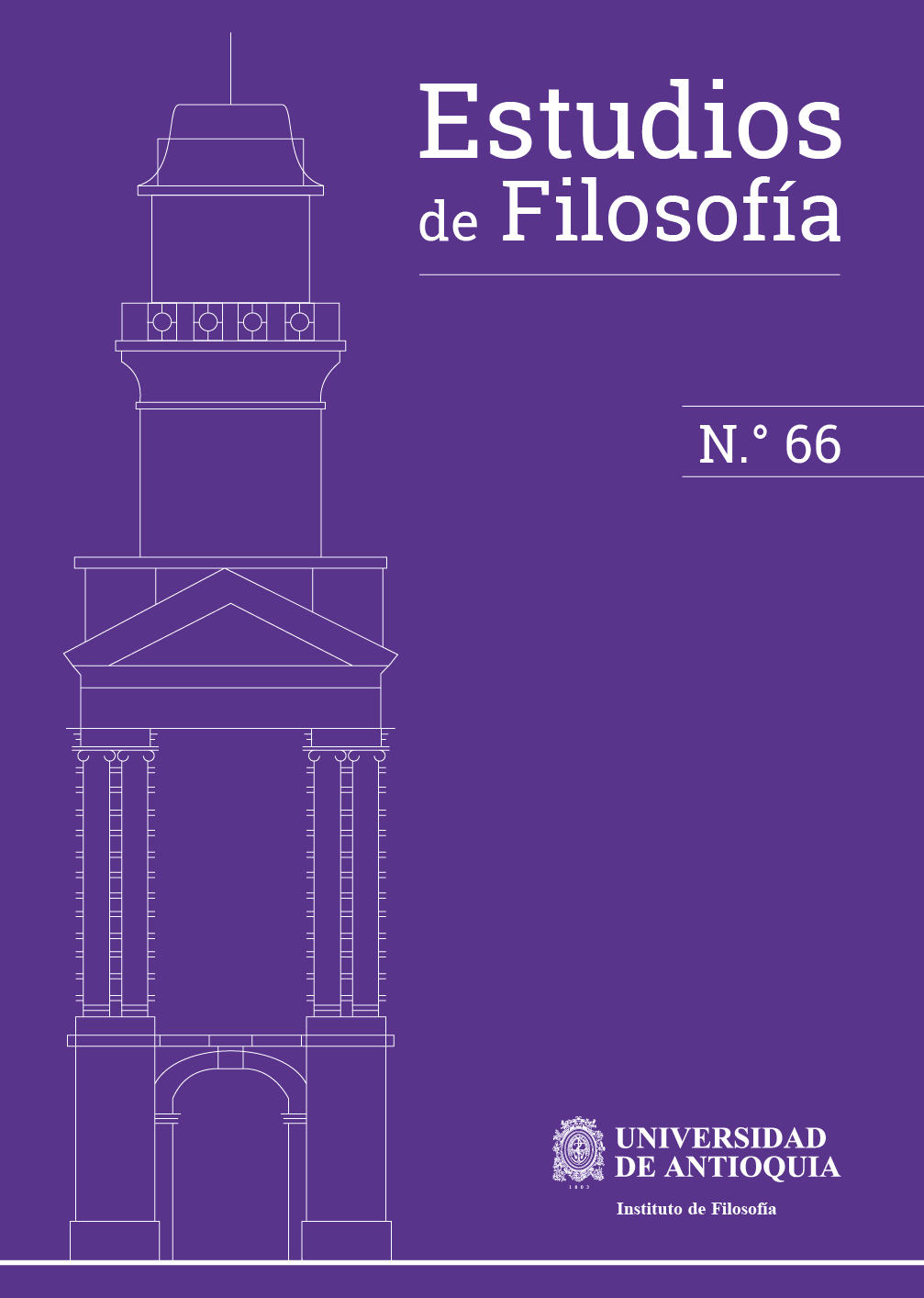Aesthetics of resistance: reimagining critical philosophy with María del Rosario Acosta López’s grammars of listening
DOI:
https://doi.org/10.17533/udea.ef.349613Keywords:
listening, aesthetics, critical philosophy, resistance, silencingAbstract
This paper analyzes the innovative way of doing critical philosophy that María del Rosario Acosta López proposes in her aesthetics of resistance and grammars of the unheard. The paper examines the contributions of two sets of conversations with Acosta López’s critical philosophy. In the first place, staging a dialogue between Acosta López and Black feminist philosophy, the article offers a defence of reconceptualizing philosophy in the 21st Century through a dialogue with the voices and perspectives of the excluded and silenced—a reconceptualization that reimagines the critical role of philosophy. In the second place, the paper calls attention to the crucial significance of Acosta López’s aesthetics of resistance for contemporary debates in contemporary political epistemology, putting in conversation her grammars of the unheard with my epistemology of resist- ance and María Lugones’s concept of complex communication. This second conversation also underscores a new way of understanding the critical and transformative function of philosophy by centering the voices and perspectives of the excluded and silenced.
Downloads
References
Acosta, M del R. (2022). De la estética como crítica a las gramáticas de la escucha: resistencias estéticas frente a la violencia epistémica. M. C. Salinas, J. D. Franco, Y. Sánchez, S. Cadavid (Trads.).Estudios de Filosofía,66,131-155.https://doi.org/10.17533/udea.ef.349487
Alcoff, L. (2006). Visible identities: race, gender, and the self. Oxford University Press. https://doi.org/10.1093/0195137345.001.0001
Anzaldúa, G. (1987). Borderlands/La Frontera: the new mestiza. Aunt Lute Books. Chanter, T. (2017). Art, politics and Rancière: broken perspectives. Bloomsbury.
De Sousa Santos, B. (2014). Epistemologies of the south: justice against epistemicide. Routledge. Fricker, M. (2007). Epistemic injustice. Oxford University Press. https://doi.org/10.1093/acprof:oso/9780198237907.001.0001
Hill Collins, P. (1990/2000). Black feminist thought: knowledge, consciousness, and the politics of empowerment. Unwin Hyman.
Isasi-Díaz, A. M. & Mendieta, E. (Eds.). (2011). Decolonizing epistemologies: Latina/o theology and philosophy. Fordham University Press. https://doi.org/10.5422/fordham/9780823241354.001.0001
Lugones, María. (2003). Pilgrimmages/Peregrinajes: theorizing coalition against multiple oppressions. Roman & Littlefield Publishers.
Lugones, M. (2006). On complex communication. Hypatia, 21(3), 75-85. https://doi.org/10.1111/j.1527-2001.2006.tb01114.x
Machado, A. (2018). Poesías completas de Antonio Machado. Editorial Manuel Castro Domínguez.
Medina, J. (2013). The epistemology of resistance: gender and racial oppression, epistemic injustice, and resistant imagination. Oxford University Press. https://doi.org/10.1093/acprof:oso/9780199929023.001.0001
Medina, J. (2020). Complex communication and decolonial struggles: the forging of deep coalitions through emotional echoing and resistant imaginations. Critical Philosophy of Race, 8(1-2), 212-236. https://doi.org/10.5325/critphilrace.8.1-2.0212
Medina, J. (2022a). Injusticia epistémica y activismo epistémico en las protestas sociales feministas. Revista Latinoamericana de Filosofía Política, 10(8), 227-250.
Medina, J. (2022b). Philosophy of protest and epistemic activism. In N. McHugh, I. Olasov & L. McIntyre (Eds.), A Companion to Public Philosophy. Blackwell. https://doi.org/10.1002/9781119635253.ch13
Medina, J. (En Preparación). Activismo epistémico y la epistemología del empoderamiento Quaderns de Filosofia.
Ortega, M. (2016). In-Between: Latina feminist phenomenology, multiplicity, and the self. State University of New York Press.
Rancière, J. (2010). Dissensus: on politics and aesthetics. Bloomsbury. https://doi.org/10.5040/9781472547378.ch-001
Rancière, J. (2013). The politics of aesthetics. Bloomsbury.
Shotwell, A. (2016). Against purity: living ethically in compromised times. University of Minnesota Press.
Zambrana, R. (2018). Pasarse políticamente: interrupting neoliberal temporality. Diacríticos, 46(2), 98-116. https://doi.org/10.1353/dia.2018.0011
Zambrana, R. (2021) Colonial debts. The case of Puerto Rico. Duke University Press. https://doi.org/10.1215/9781478013198
Published
How to Cite
Issue
Section
Categories
License
Copyright (c) 2022 José Medina

This work is licensed under a Creative Commons Attribution-NonCommercial-ShareAlike 4.0 International License.
Authors who publish with this journal agree to the following terms:
1. The Author retains copyright in the Work, where the term "Work" shall include all digital objects that may result in subsequent electronic publication or distribution.
2. Upon acceptance of the Work, the author shall grant to the Publisher the right of first publication of the Work.
3. The Author shall grant to the Publisher a nonexclusive perpetual right and license to publish, archive, and make accessible the Work in whole or in part in all forms of media now or hereafter known under a Creative Commons Attribution-NoCommercia-ShareAlike (CC BY-NC-SA 4.0), or its equivalent, which, for the avoidance of doubt, allows others to copy, distribute, and transmit the Work under the following conditions: (a) Attribution: Other users must attribute the Work in the manner specified by the author as indicated on the journal Web site;(b) Noncommercial: Other users (including Publisher) may not use this Work for commercial purposes;
4. The Author is able to enter into separate, additional contractual arrangements for the nonexclusive distribution of the journal's published version of the Work (e.g., post it to an institutional repository or publish it in a book), as long as there is provided in the document an acknowledgement of its initial publication in this journal;
5. Authors are permitted, and Estudios de Filosofía promotes, to post online the preprint manuscript of the Work in institutional repositories or on their Websites prior to and during the submission process, as it can lead to productive exchanges, as well as earlier and greater citation of published work (see The Effect of Open Access). Any such posting made before acceptance and publication of the Work is expected be updated upon publication to include a reference to the Estudios de Filosofía's assigned URL to the Article and its final published version in Estudios de Filosofía.
















